Second in a two-part series based on data from the recently released Multinational Study of Attitudes Toward Individuals With Intellectual Disabilities, administered by Gallup and the University of Massachusetts Boston for Special Olympics Inc.
For American parents, few concerns come before the education of their children. In January 2003, when asked how important it is that the president and Congress deal with the issue of education in the coming year, 83% of Americans said "extremely important" or "very important." It's such a huge concern that, as any real estate agent will attest, property values are driven to a considerable degree by the quality of area schools.
In that light, it's not surprising that a large number of Americans -- 64% -- think special schools are best for children with mental retardation. Inclusiveness is nice in principle, but if Americans feel the inclusion of such children threatens to stretch the educational resources of schools attended by their non-disabled kids, principle may give way to practical concerns.
About two in five Americans feel including kids with mental retardation in the same classes with non-disabled kids would cause discipline problems and make it harder for the other kids to learn (see "Separate but Equal? Americans Favor Special Schools for Mentally Disabled" in Related Items).
When asked more specifically about barriers to including children with mental retardation in classrooms with other kids, the lack of special resources at schools and lack of teacher preparation are each considered "major obstacles" by about 7 in 10 Americans.
Undoubtedly, resource issues are a major concern. But that concern may be somewhat inflated by widespread misconceptions about the mentally handicapped population. Dr. Gary Siperstein of the University of Massachusetts Boston, the study's lead researcher, finds the high number of Americans favoring special schools surprising given numerous U.S. policies and legislation that mandate the inclusion of children with disabilities in all aspects of education. "One can assume that here in the U.S.," he said, "the public underestimates the capabilities of children with mental retardation to learn within the inclusive classroom."
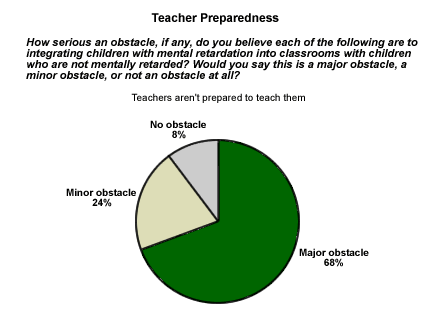
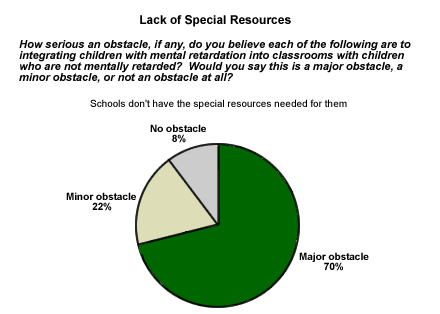
It's good news that fewer Americans feel that disabilities themselves would be a barrier in integrated classrooms -- 48% say the fact that "children with mental retardation have difficulty learning because they're mentally retarded" would be a major obstacle. But a majority of Americans feel that the cruelty of other kids could be a problem: 57% say they think other children's negative attitudes are a major obstacle to the inclusion of kids with mental retardation in regular classrooms.
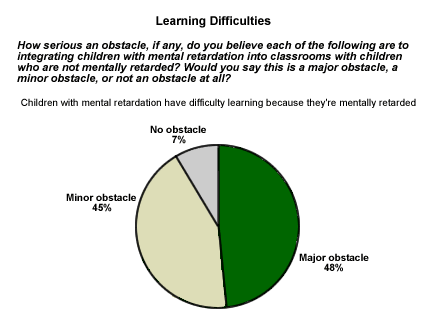
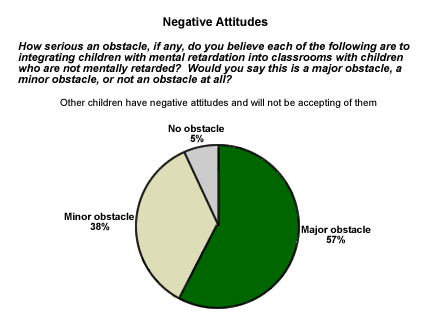
Abbey Spaulding, an elementary school teacher Lincoln, Neb., has taught in special education classrooms consisting of all mentally handicapped kids, as well as in mixed classrooms. She strongly favors the latter approach, and views the attitudes of other kids as an argument for, rather than against, inclusiveness.
"In the younger grades, you don't see much of that kind of teasing," Spaulding said. "In fact, for the most part the [non-disabled] kids are very sweet and nurturing to the special-ed kids. I think if children have more exposure to handicapped kids at a younger age, they're less likely to form those kinds of [negative] attitudes as they get older."
Are Teachers Prepared?
The most commonly perceived barriers to integrated classrooms are the lack of adequate resources, in terms of both schools and the training teachers receive. Still, in comparison with results from other countries included in the study, the percentages of Americans saying lack of resources and teacher preparation are major barriers to the inclusion of kids with mental retardation are relatively low. Only in Nigeria are these factors less likely to be seen as obstacles; on the other hand, only 11% of Nigerians favor teaching children with mental retardation in the same schools with everyone else.
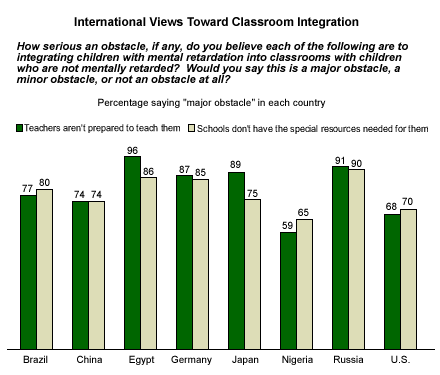
Bottom Line
The fact that two-thirds of Americans feel special schools are the best option for children with mental retardation is alarming to people who work with people who are mentally retarded, including those at Special Olympics who argue that this population's quality of life hinges on overcoming barriers to inclusion in society.
Spaulding feels all educators and parents need to be concerned about those barriers. "It's important for children to be exposed to the fact that there are people in the world with different needs and abilities, so that they'll be more accepting of those people throughout their lives. Taking those kids out of the regular education population is a little like returning to how handicapped people were treated in the past, putting them in ‘lockdown' facilities and hiding them away."
*For the Multinational Study of Attitudes Toward Individuals With Intellectual Disabilities, more than 6,400 interviews were completed by The Gallup Organization with adults in Brazil, China, Egypt, Germany, Japan, Nigeria, Russia, and the United States. A minimum of 800 interviews were conducted with a general population of adults in each country. In the United States, interviewing was conducted between Oct. 7 and Nov. 18, 2002. In total, 801 Americans age 18 and over were interviewed in the study. Results based on this sample size are subject to an error attributable to sampling and other random effects of ±3 percentage points at the 95% confidence level.